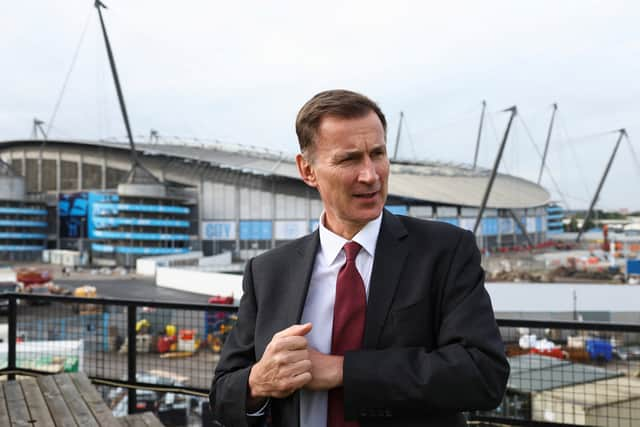National living wage: what is current UK rate in 2023, NLW 2024 increase explained - Jeremy Hunt speech
and live on Freeview channel 276
Chancellor Jeremy Hunt is expected to announce that the national living wage will rise to at least £11 an hour starting in April of next year.
In a speech to the Tory party conference today (2 October), Hunt is also expected to announce that ministers will reexamine the benefit sanctions regime in an effort to help the unemployed find new employment.
Advertisement
Hide AdAdvertisement
Hide AdBut what is the national living wage, by how much is it increasing, and how will that change affect you? Here is everything you need to know about it.
What is the national living wage?
The UK's national living wage was introduced by the government to ensure that workers receive a minimum hourly wage that is considered sufficient for them to live on.
A policy initiative of the Conservative government, it was announced in the 2015 Budget by then-Chancellor George Osborne and introduced in April 2016. The primary purpose of the national living wage is to improve the earnings and living standards of low-paid workers.


The national living wage is a legally mandated minimum wage rate for workers aged 25 and over designed to provide workers with a wage that is higher than the standard minimum wage. Employers are legally required to pay eligible workers aged 25 and over the national living wage rate.
Advertisement
Hide AdAdvertisement
Hide AdThe rate may change from year to year, and there are separate minimum wage rates for workers aged under 25, which are generally lower than the national living wage.
How much will the national living wage rise to?
The government has already set a goal for the national living wage to reach two-thirds of the median hourly wage by next October, a change which is expected to benefit two million of the lowest paid people.
The Low Pay Commission estimates the rate required to meet that target should be between £10.90 and £11.43, with a central estimate of £11.16.
Hunt is expected to say: “Today I want to complete another great Conservative reform, the national living wage. Since we introduced it, nearly two million people have been lifted from absolute poverty. But today, we go further.
Advertisement
Hide AdAdvertisement
Hide Ad“We promised in our manifesto to raise the national living wage to two-thirds of median income – ending low pay in this country. At the moment it is £10.42 an hour and we are waiting for the Low Pay Commission to confirm its recommendation for next year.
“But I confirm today, whatever that recommendation, we will increase it next year to at least £11 an hour."
What will the rate rise mean for me?
Hunt will say that the rise to the rate of national living wage will equate to "a pay rise for over two million workers," and is expected to claim that "the wages of the lowest paid are over £9,000 a year higher than they were in 2010."
What else will Jeremy Hunt say?
The Chancellor is also expected to warn that things have gone in the “wrong direction” since the pandemic when it comes to people out of work. Efforts to encourage parts of the population back into the workplace, in a bid to boost productivity, have been an ongoing concern for ministers.
Advertisement
Hide AdAdvertisement
Hide AdHunt and Work and Pensions Secretary Mel Stride are expected to use November’s Autumn Statement to set out proposals that would make it harder for people to claim benefits if they refuse to take “active steps” to move into work.
"We will look at the way the sanctions regime works. It is a fundamental matter of fairness," Hunt is expected to say. "Those who won’t even look for work do not deserve the same benefits as people trying hard to do the right thing.”
Comment Guidelines
National World encourages reader discussion on our stories. User feedback, insights and back-and-forth exchanges add a rich layer of context to reporting. Please review our Community Guidelines before commenting.
